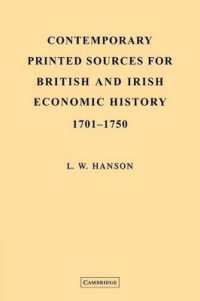- ホーム
- > 洋書
- > 英文書
- > Business / Economics
Full Description
for some events or the follow-on activities for others may cover more than one time period and is placed where it seemed most relevant. The book takes a multimodal perspective and attempts to provide a balanced view among a number of subject areas including: Signif icant Federal le gislation Major, relevant Federal regulations and policies Highw ay concerns T ransit concerns En vironmental issues Ener gy issues Safety issues Rele v ant conferences T echnological de v elopments T ransportation service alternati v es Manuals and methodological developments National transportation studies National data resources Local e v ents with national signif icance Ov er the years, the author has discussed these events with many persons in the profession. Often they had participated in or had firsthand knowledge of the events. The author appreciates their assistance, even though they are too numerous to m- tion specifically. In preparing this book, the author w as directly aided by several individuals who provided information on specific events. Their assistance is appreciated: Jack Bennett, Barry Berlin, Susan Binder, Norman Cooper, Frederick W. Ducca, Sheldon H. Edner, Christopher R.
Fleet, Charles A. Hedges, Donald Igo, Anthony R. Kane, Thomas Koslowski, Ira Laster, William M. Lyons, James J. McDonnell, Florence Mills, Camille C. Mittelholtz, Norman Paulhus, Elizabeth A. Parker, John Peak, Sam Rea, Carl Rappaport, Elizabeth Riklin, James A. Scott, Mary Lynn Tischer, Martin Wachs, Jimmy Yu, and Samuel Zimmerman.
Contents
Early Highway Planning.- Launching Urban Transportation Planning and the Interstate Highway System.- Urban Transportation Planning Comes of Age.- Improving Intergovernmental Coordination.- Rising Concern for the Environment and Citizen Involvement.- Beginnings of Multimodal Urban Transportation Planning.- Transition to Short-Term Planning.- Emphasizing Urban Economic Revitalization.- Decentralization of Decision-making.- Promoting Private Sector Participation.- The Need for Strategic Planning.- The Growth of Sustainable Development.- Expanding Participatory Democracy.- Moving Toward Performance-Based Planning.- Concluding Remarks.








